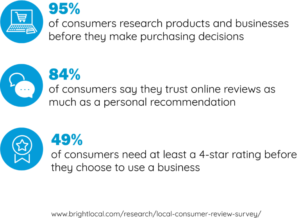Managing Your Online Reputation: Why It’s Important and How to Protect Yourself and Your Small Business
Your business’s good reputation is one of its greatest assets. It differentiates you from the competition, and customers will pay a premium to do business with a reliable company they can trust.
In the past, a business’s reputation was established over time by word of mouth. Today, thanks to the Internet, reputations can quickly rise and fall based on online commentary instantly accessible to a wide audience. A great review can bring a welcome flood of business. A bad appraisal can do your business harm.
Defamatory statements, whether written or posted online, may be considered libel in a court of law. Most general liability policies offer protection for libelous damage your business may cause to another business or individual. Conversely, you can sue an offending party if you believe your business is the victim of false or damaging statements. However, such lawsuits can be costly and difficult to prove, and in the digital era when unexpected comments can pop up in surprising places, you need to pick your battles.
How to Proactively Manage Your Small Business’s Online Reputation
No matter the size of your business, people are probably talking about you online. They may be sharing a customer experience on Facebook, rating your business on Google+, leaving a comment on your blog or writing a letter to the editor of your local newspaper. Potential customers who read these perspectives take them to heart.
Some 95 percent of consumers research products and businesses online before they make purchasing decisions and 84 percent say they trust online reviews as much as a personal recommendation. So it’s important to know what your customers are saying and take steps to respond in a way that will reflect favorably on you and your business.
These tips can help you take proactive steps to manage your online reputation—and may prevent you from having to go to court.
Do a Detailed Search
Monitoring your online presence should begin with a thorough online search. Search for your name and your business’s name and repeat with all available search engines, including Google, Yahoo and Bing. Take note of what comes up, particularly on the first four to five pages of your search. If you encounter any undesirable content, including photos, remove what is under your control.
Check Social Media, Blogs and Business Directories
Social media sites such as Facebook, LinkedIn and Twitter are popular places for customers to post comments and share feedback. Free online business directories such as Google My Business, Yellow Pages, Yelp and Angie’s List also encourage customer reviews and commentary. Visit these sites periodically to run a search for your business. To simplify the process, try Yext, a free online service that lists all directories where your business appears. From here you can easily review and update your business information, such as your hours of operation and location. You can also scan all complaint websites in a single search using Go Fish Digital.
Respond to Negative Reviews
If you encounter negative comments about your business, take action quickly:
- Contact websites where the negative commentary appears. They will remove content that violates their policies, but in the interest of sharing both positive and negative opinions, sites generally leave all reviews up unless you present a court subpoena as proof of libel.
- Respond privately to complainants whose names you know. Thank them for their feedback, apologize for their unsatisfactory experience and gather more information to help you resolve their concerns in a way that is appropriate for the circumstances. For example, you may reimburse a customer for poor service or offer compensation such as a gift certificate to a local restaurant.
- Respond online. Acknowledge the customer’s frustration and thank them for bringing the concern to your attention. Own up to any mistakes and outline what you will do or have done to repair the situation, especially if you’ve already had an offline conversation. Readers will see that you value hearing from your customers and care about their experience.
- Be friendly and constructive in all of your communications. A rude, dismissive or defensive response can only further damage your reputation, while an even-tempered and thoughtful reply will show your concern and willingness to make things better.
To offset the effects of any negative reviews, encourage your satisfied customers to post positive reviews of your business. Seven out of 10 consumers will leave a review for a business when asked.
Sign Up for Google Alerts
Google Alerts are a simple way to stay on top of online mentions of your business, including web pages, newspaper articles and blogs. Google Alerts are free and easy to set up, and you’ll receive an email whenever Google finds results that meet your search terms. You can also monitor references to your business on social media with tools such as Awario, Mention and Brand24 which are available for a monthly fee. Some mentions of your business may still slip through the cracks, but these tools equip you with a means to take prompt and proactive measures to manage your online reputation.
A few negative reviews don’t need to ruin your business. You can learn from them and improve your standing with customers based on your response. Your best defense is to be good to your customers and interact with goodwill, whether they’re right or wrong.
